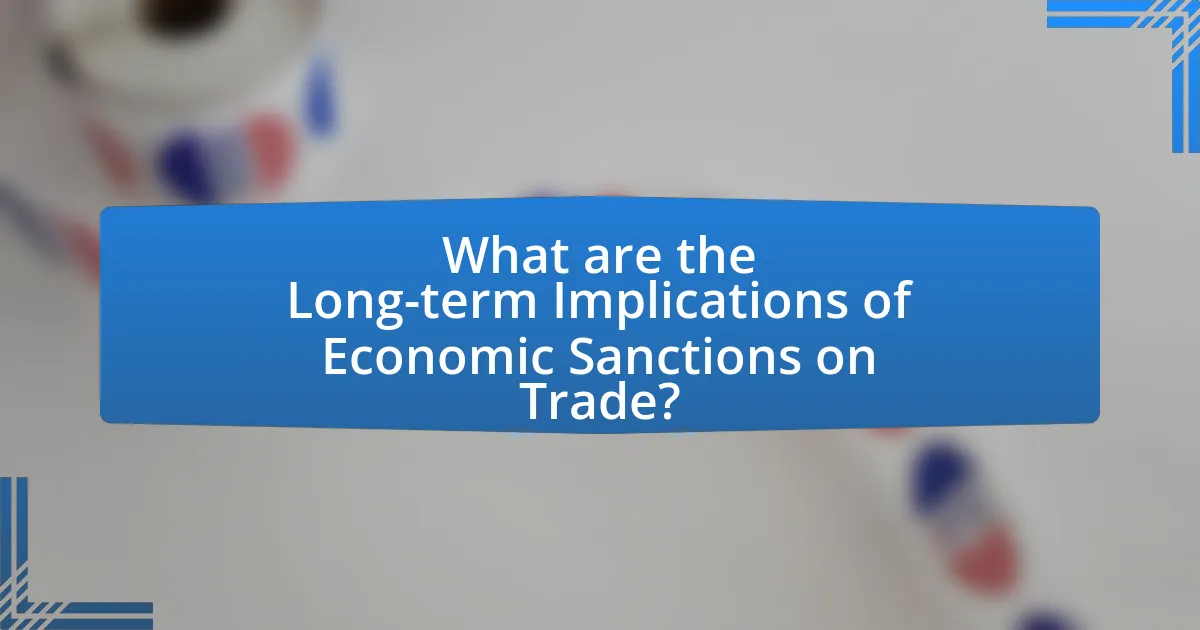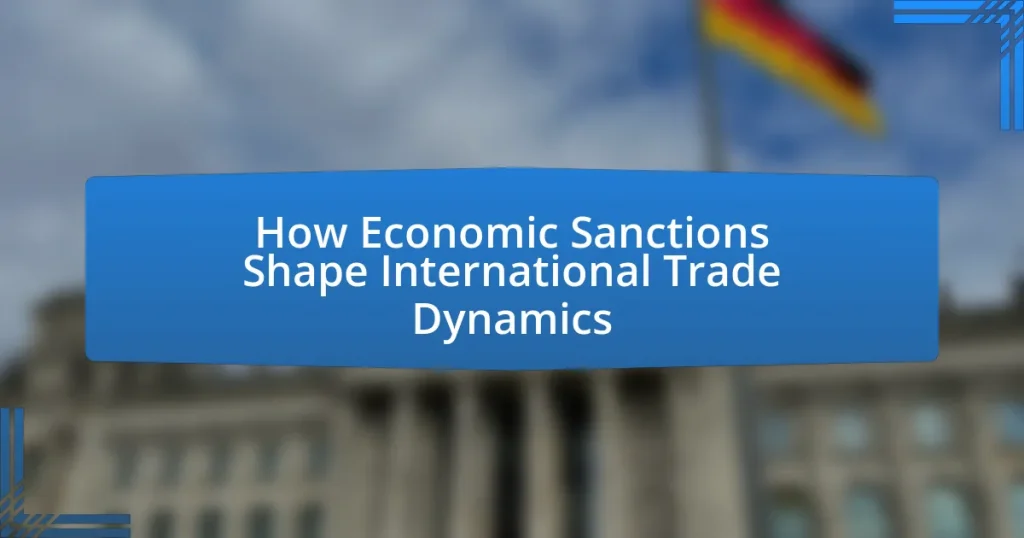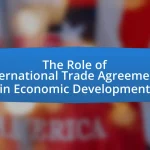Economic sanctions are restrictive measures imposed by countries or international organizations to influence the behavior of targeted nations, groups, or individuals, primarily aimed at enforcing compliance with international laws or norms. This article examines how economic sanctions disrupt international trade dynamics, detailing their types, impacts on trade flows, and the sectors most vulnerable to these measures. It also explores the long-term implications of sanctions on economic development and global trade patterns, highlighting case studies that illustrate their effectiveness and offering insights into best practices for future sanctions implementation. Through this analysis, the article underscores the complex relationship between economic sanctions and international trade, emphasizing their role in shaping geopolitical landscapes.

What are Economic Sanctions and Their Purpose?
Economic sanctions are restrictive measures imposed by countries or international organizations to influence the behavior of a target nation, group, or individual. Their primary purpose is to compel compliance with international laws or norms, deter undesirable actions, or punish violations, often in response to issues such as human rights abuses, terrorism, or aggression. For instance, the United States has implemented economic sanctions against countries like Iran and North Korea to curb their nuclear programs and promote regional stability. These sanctions can include trade restrictions, asset freezes, and financial barriers, significantly impacting the target’s economy and international relations.
How do economic sanctions impact international trade?
Economic sanctions significantly disrupt international trade by restricting the flow of goods, services, and capital between countries. These measures often lead to decreased exports and imports for the targeted nation, as businesses and governments comply with the sanctions to avoid penalties. For instance, the U.S. sanctions on Iran resulted in a dramatic decline in its oil exports, dropping from 2.5 million barrels per day in 2017 to less than 300,000 barrels per day by 2020. This reduction not only affected Iran’s economy but also altered global oil markets, demonstrating how sanctions can have far-reaching effects beyond the targeted country.
What types of economic sanctions are commonly used?
Economic sanctions commonly used include trade sanctions, financial sanctions, and targeted sanctions. Trade sanctions restrict the exchange of goods and services with a specific country, often aimed at limiting its economic capabilities. Financial sanctions involve prohibiting financial transactions or freezing assets of individuals, companies, or governments, which can severely impact their economic operations. Targeted sanctions, also known as smart sanctions, focus on specific individuals or entities rather than entire countries, aiming to minimize humanitarian impacts while still exerting pressure. These types of sanctions have been employed in various geopolitical contexts, such as the United States imposing trade and financial sanctions on Iran to curb its nuclear program, demonstrating their effectiveness in influencing international relations and trade dynamics.
How do sanctions differ from other trade restrictions?
Sanctions differ from other trade restrictions primarily in their intent and application; sanctions are specifically designed to achieve political or diplomatic objectives by penalizing a country or entity, while other trade restrictions, such as tariffs or quotas, are typically aimed at protecting domestic industries or regulating trade balances. For instance, the United States imposed economic sanctions on Iran to curb its nuclear program, which directly targeted specific sectors and entities, contrasting with tariffs that might be applied broadly to protect local manufacturers from foreign competition. This distinction highlights that sanctions are often more punitive and politically motivated, whereas other trade restrictions may focus on economic protectionism or trade regulation without necessarily involving political objectives.
Why are economic sanctions imposed by countries?
Economic sanctions are imposed by countries primarily to influence the behavior of other nations or entities, often in response to actions deemed unacceptable, such as human rights violations, aggression, or nuclear proliferation. These measures aim to exert economic pressure, thereby compelling the targeted country to change its policies or actions. For instance, the United States imposed sanctions on Iran to deter its nuclear program, which is a clear example of using economic tools to achieve foreign policy objectives.
What political objectives do sanctions aim to achieve?
Sanctions aim to achieve political objectives such as altering the behavior of targeted states, deterring aggression, and promoting compliance with international laws. By imposing economic restrictions, governments seek to pressure regimes into changing policies or actions that are deemed unacceptable, such as human rights violations or military aggression. Historical examples include the sanctions against South Africa during apartheid, which aimed to dismantle the oppressive regime, and the sanctions imposed on Iran to curb its nuclear program, which sought to compel compliance with international agreements. These measures are designed to create economic hardship that incentivizes political change.
How do sanctions reflect international relations and diplomacy?
Sanctions reflect international relations and diplomacy by serving as tools for states to exert pressure on other nations to change specific behaviors or policies. For instance, the United States imposed economic sanctions on Iran to deter its nuclear program, demonstrating how sanctions can be used to influence a country’s actions in the international arena. These measures often signal disapproval and can isolate the targeted nation diplomatically and economically, thereby reinforcing the power dynamics between states. The effectiveness of sanctions is often evaluated through their ability to compel compliance, as seen in the case of South Africa, where international sanctions contributed to the end of apartheid, illustrating their role in shaping diplomatic relations and promoting global norms.

How do Economic Sanctions Affect Trade Dynamics?
Economic sanctions significantly disrupt trade dynamics by restricting the flow of goods, services, and capital between countries. These sanctions can lead to reduced export and import volumes, as countries targeted by sanctions often face barriers that limit their access to international markets. For instance, the U.S. sanctions on Iran resulted in a dramatic decline in its oil exports, dropping from 2.5 million barrels per day in 2017 to less than 300,000 barrels per day by 2020, illustrating how sanctions can severely impact a nation’s trade capabilities. Additionally, sanctions can alter global supply chains, as businesses seek to avoid legal repercussions and reputational damage associated with trading with sanctioned entities. This shift can lead to increased costs and inefficiencies in international trade, as companies must find alternative suppliers or markets.
What are the immediate effects of sanctions on trade flows?
The immediate effects of sanctions on trade flows include a significant reduction in exports and imports between the sanctioned country and the imposing countries. For example, following the imposition of sanctions on Iran in 2012, its oil exports dropped by approximately 60%, illustrating how sanctions can disrupt established trade relationships and supply chains. Additionally, businesses in the imposing countries often face legal and financial risks, leading to a withdrawal from trade with the sanctioned nation, further exacerbating the decline in trade flows.
How do sanctions alter supply chains and market access?
Sanctions significantly disrupt supply chains and market access by restricting trade and financial transactions with targeted countries. These restrictions lead to increased costs and delays in sourcing materials, as companies must seek alternative suppliers outside the sanctioned nation. For instance, the U.S. sanctions on Iran have forced many businesses to exit the Iranian market, resulting in a 50% drop in Iran’s oil exports between 2018 and 2020, which illustrates the direct impact on market access. Additionally, sanctions can lead to a reconfiguration of global supply chains, as firms adapt to new regulatory environments and seek to mitigate risks associated with compliance. This alteration often results in reduced efficiency and higher prices for consumers, as companies face challenges in maintaining their supply chain integrity.
What sectors are most vulnerable to the impact of sanctions?
The sectors most vulnerable to the impact of sanctions include finance, energy, and defense. The finance sector is particularly affected due to restrictions on banking transactions and access to international financial markets, which can severely limit a country’s ability to conduct trade. The energy sector faces vulnerabilities as sanctions can target oil exports and investments in energy infrastructure, leading to significant revenue losses. The defense sector is impacted by restrictions on arms sales and technology transfers, hindering a nation’s military capabilities. Historical examples include the sanctions imposed on Iran, which crippled its oil exports and financial transactions, demonstrating the profound effects on these sectors.
How do countries adapt to economic sanctions?
Countries adapt to economic sanctions by implementing various strategies to mitigate their impact on the economy. These strategies include diversifying trade partners, enhancing domestic production capabilities, and seeking alternative financial systems. For instance, countries like Iran have shifted their trade focus towards non-Western nations, such as China and Russia, to bypass restrictions imposed by Western sanctions. Additionally, nations often invest in self-sufficiency in critical sectors, such as agriculture and energy, to reduce reliance on imports affected by sanctions. Historical examples, such as North Korea’s development of its nuclear program in response to sanctions, illustrate how countries may also pursue controversial policies to assert their sovereignty and maintain economic stability despite external pressures.
What strategies do nations employ to mitigate the effects of sanctions?
Nations employ various strategies to mitigate the effects of sanctions, including diversifying trade partners, enhancing domestic production, and utilizing alternative financial systems. By diversifying trade partners, countries can reduce reliance on nations imposing sanctions, as seen with Russia increasing trade with China and India following Western sanctions. Enhancing domestic production allows nations to become self-sufficient, exemplified by Iran’s efforts to boost local manufacturing in response to sanctions. Additionally, utilizing alternative financial systems, such as cryptocurrencies or barter trade, helps circumvent traditional banking systems affected by sanctions, as demonstrated by Venezuela’s use of cryptocurrencies to facilitate trade. These strategies collectively enable nations to lessen the economic impact of sanctions and maintain some level of economic stability.
How do businesses respond to changes in trade dynamics due to sanctions?
Businesses respond to changes in trade dynamics due to sanctions by adjusting their supply chains, seeking alternative markets, and modifying their product offerings. For instance, when the United States imposed sanctions on Iran, many companies shifted their sourcing strategies to avoid exposure to restricted markets, leading to a reconfiguration of global supply chains. Additionally, businesses often explore new markets that are not affected by sanctions to maintain revenue streams, as seen when European firms increased trade with Asian countries in response to sanctions on Russia. Furthermore, companies may adapt their products to comply with regulatory requirements or to cater to the needs of different markets, ensuring they remain competitive despite the constraints imposed by sanctions.

What are the Long-term Implications of Economic Sanctions on Trade?
Economic sanctions have significant long-term implications on trade, primarily leading to reduced trade volumes and altered trade relationships. Over time, countries subjected to sanctions often experience a decline in exports and imports, as seen in the case of Iran, where sanctions led to a 60% drop in oil exports between 2012 and 2016. Additionally, sanctions can push affected nations to seek alternative trading partners, resulting in the establishment of new trade networks that may not align with global economic norms. This shift can lead to a reconfiguration of global supply chains, as businesses adapt to the new trade landscape, often increasing costs and reducing efficiency. Furthermore, the long-term isolation from international markets can stifle economic growth and innovation in sanctioned countries, as evidenced by North Korea’s persistent economic struggles due to prolonged sanctions.
How do sanctions influence global trade patterns over time?
Sanctions significantly alter global trade patterns by restricting the flow of goods and services between nations. Over time, countries targeted by sanctions often experience a decline in exports and imports, leading to reduced economic activity and shifts in trade relationships. For instance, the sanctions imposed on Iran in 2012 resulted in a dramatic decrease in its oil exports, which fell from 2.5 million barrels per day to around 1 million barrels per day, as reported by the International Energy Agency. This decline forced Iran to seek alternative markets and trade partners, thereby reshaping its trade dynamics. Additionally, countries that impose sanctions may also face retaliatory measures, which can further complicate and alter their own trade patterns. The long-term effects of sanctions can lead to the establishment of new trade alliances and the diversification of supply chains, as nations adapt to the restrictions imposed on them.
What are the potential shifts in alliances and partnerships?
Potential shifts in alliances and partnerships may occur as countries reassess their economic strategies in response to sanctions. For instance, nations facing sanctions often seek new trade partners to mitigate economic isolation, leading to realignments such as increased cooperation among countries with similar geopolitical interests. Historical examples include Russia’s pivot towards China following Western sanctions in 2014, which resulted in enhanced economic ties and energy agreements. Additionally, countries may form new coalitions, such as the BRICS group, to counterbalance Western influence and create alternative trade networks. These shifts are driven by the need for economic resilience and strategic partnerships in a changing global landscape.
How do sanctions affect economic development in targeted countries?
Sanctions negatively impact economic development in targeted countries by restricting access to international markets, capital, and resources. These restrictions lead to reduced foreign investment, decreased trade volumes, and limited economic growth opportunities. For instance, the sanctions imposed on Iran in 2012 resulted in a significant contraction of its economy, with GDP shrinking by approximately 6.6% in 2012 and 1.9% in 2013, according to the International Monetary Fund. Additionally, sanctions can exacerbate poverty and unemployment, as businesses struggle to operate under constrained conditions, further hindering overall economic progress.
What lessons can be learned from past sanctions regimes?
Past sanctions regimes demonstrate that targeted sanctions can effectively pressure governments to change behavior, as seen in the case of South Africa during the apartheid era, where international sanctions contributed to the end of racial segregation policies. Additionally, the effectiveness of sanctions often diminishes over time, as evidenced by the prolonged sanctions against Iraq in the 1990s, which failed to achieve their intended political outcomes and instead led to humanitarian crises. Furthermore, the unintended consequences of sanctions, such as strengthening authoritarian regimes by rallying domestic support against perceived external threats, were evident in countries like Iran, where sanctions bolstered the government’s narrative of resistance. These lessons highlight the importance of carefully designing sanctions to minimize negative impacts while maximizing their potential to achieve foreign policy objectives.
What case studies illustrate the effectiveness of sanctions?
Case studies illustrating the effectiveness of sanctions include the United States’ sanctions against Iran, which significantly impacted its economy and nuclear program. Following the imposition of sanctions in 2012, Iran’s GDP contracted by approximately 6% annually, and its oil exports plummeted from 2.5 million barrels per day to around 300,000 by 2016. Another example is the sanctions imposed on South Africa during the apartheid era, which contributed to the end of racial segregation policies. International sanctions led to a decline in foreign investment and economic isolation, ultimately pressuring the government to negotiate reforms. These cases demonstrate how targeted economic sanctions can effectively alter a nation’s policies and behaviors.
How can future sanctions be designed to minimize negative impacts?
Future sanctions can be designed to minimize negative impacts by incorporating targeted measures that focus on specific individuals or entities rather than broad economic restrictions. This approach reduces collateral damage to the general population and essential services, as evidenced by the effectiveness of targeted sanctions in cases like the United Nations sanctions on South Africa during apartheid, which aimed at specific government officials and entities rather than the entire economy. Additionally, implementing humanitarian exemptions can ensure that essential goods, such as food and medicine, remain accessible to the civilian population, as seen in the sanctions regimes against Iraq in the 1990s, which highlighted the need for such provisions to alleviate humanitarian crises. Furthermore, engaging in diplomatic efforts alongside sanctions can create pathways for negotiation and resolution, thereby reducing the long-term economic fallout and fostering a more stable international environment.
What best practices should countries consider when implementing sanctions?
Countries should consider targeted sanctions that minimize humanitarian impact while effectively addressing the intended political or economic objectives. Targeted sanctions, such as asset freezes and travel bans on specific individuals or entities, reduce collateral damage to the general population, as evidenced by the United Nations’ guidelines on sanctions which emphasize the importance of distinguishing between state actors and civilians. Additionally, countries should ensure that sanctions are clearly defined, regularly reviewed, and coordinated with international partners to enhance effectiveness and legitimacy. Historical examples, such as the coordinated sanctions against Iran, demonstrate that multilateral efforts can lead to more significant pressure on the targeted regime while maintaining international support.


